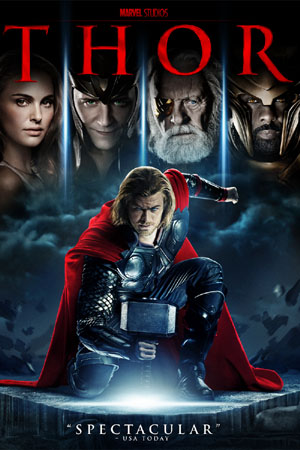 Kenneth Branagh’s Thor was one of the first wave of Marvel Universe superhero movies, and I admit I didn’t see it until much after its release – thanks to Netflix.
Kenneth Branagh’s Thor was one of the first wave of Marvel Universe superhero movies, and I admit I didn’t see it until much after its release – thanks to Netflix.
There was war between Asgard and the Frost Giants of Jotunheim under their king, Laufey (Colm Feore), who were ultimately defeated by Odin (Anthony Hopkins). He also took possession of their major weapon, the Tesseract, which is now guarded in the vaults of Asgard. This being Asgard, the Defender of the Nine Realms, there are always battles to be fought, at which Odin’s son Thor (Chris Hemsworth) has distinguished himself. And just when the king is about to name Thor as his heir, the Frost Giants manage to sneak into Asgard by a route hidden even from Heimdall (Idris Elba), who sees everything. (As it turns out, they had inside help – I probably don’t have to tell you whose.) Thor vows to destroy Jotunheim, even though the invaders have all been killed and the Tesseract is safe. Odin forbids it, but Thor, being a bit immature and more than a bit bull-headed, goes ahead. Odin is not pleased, and strips Thor of Mjollnir, his magical hammer, and most of his powers. He then exiles him to Midgard (Earth), where astrophysicist Jane Foster (Natalie Portman), her colleague Erik Selvig (Stellan Skarsgard), and her intern Darcy (Kat Dennings) are investigating anomalies in the spatio-temporal matrix. They also happen to be on-site when Thor hits ground, followed shortly, and at some distance, by Mjollnir. And Earth is about to come under attack, but not from Jotunheim.
Having seen all three of Marvel’s “first wave,” I get the feeling that the writers and directors were still feeling their way into this whole thing. Thor is well-done, but not particularly remarkable. I haven’t seen anything by Branagh since his Henry V, and strangely enough, I find the same themes threading their way through both, largely in the relationship between warriors and kings and how the first becomes the second. It’s really Thor’s coming of age story. Structurally, the film is sound, if unexceptional – pacing is good, there are vanishingly few rough spots, and it manages to maintain our interest even in the quieter sequences. We are even spared the all-out, let’s-destroy-a-major-city excesses that seem to have become commonplace in the genre.
The cast is solid. Hemsworth’s characterization of Thor is right on target: he starts off as the brash and fairly shallow warrior, sure of his own privilege, and his shock when he’s cast into exile is palpable. We can actually see Thor grow up. Tom Hiddleston’s Loki is the perfect counterpart – shadowed, subtle (although not all that subtle, at least as far as the audience is concerned, but we know he’s the bad guy), he’s so controlled and so calculated that the few instances where he drops the mask are actually shocking. The rest of the cast are equally apt, and manage to build in some depth – even Clark Gregg as S.H.I.E.L.D. agent Coulson shows some humanity. (And there’s another theme that is all too timely: Jane Foster has her first run-in with the surveillance state – at least, the first one that she knows about.)
On the whole, Thor is worth seeing, if only to whet your appetite for the sequel.
(Paramount Pictures/Marvel Entertainment, 2011) Rated PG-13, running time 115 minutes)
